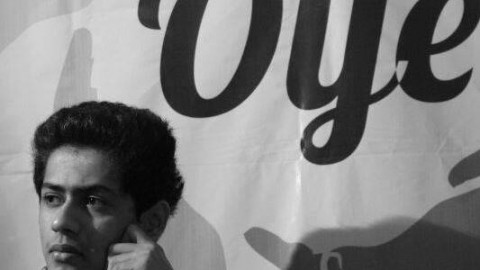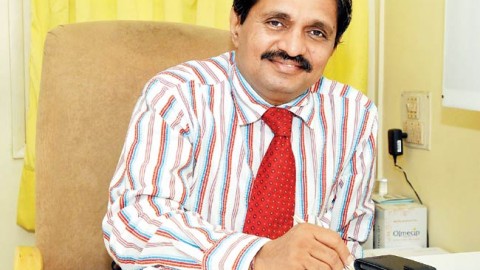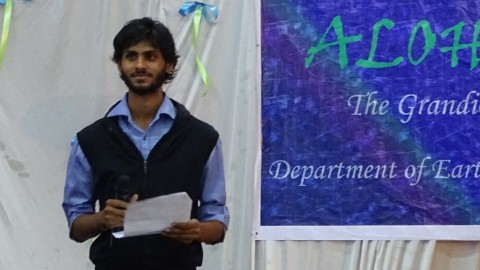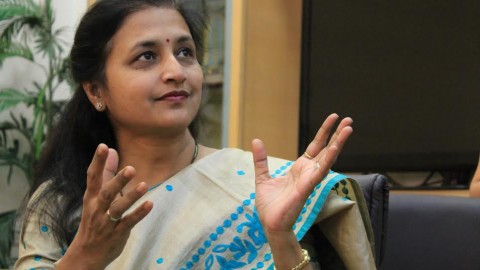
ImageCourtesy: Mumbai Mirror
Additional Municipal Commissioner (City), Mrs Pallavi Darade interacted with Spectralhues regarding choosing civil services after securing an MBBS degree, her desire to help the citizens, the challenges of field as well as administrative work, the condition of roads in Mumbai, BMC schools, garbage disposal system, the recent irksome among citizens regarding the ALM’s and a lot more.
Welcome to Spectralhues.com, ma’am
Why did you choose civil services, despite having done medical and securing an MBBS degree?
Actually, while doing MBBS I thought that this is not the career which I want. At the tender age of 18 you don’t know much about life and as you grow you change. While being trained in the medical college, I thought I should contribute in a different manner to the people and society. My father being from the Information and Broadcasting service was an added advantage and feel which I could see. And I was always attracted towards civil services – because father was in the services, all his friends were in the services. I wanted a career where-in I could contribute to social service too. So, this was the best option I think I had and I thought of giving it a try. I have always believed if you have the intention of doing things and you have the government machinery at your disposal, then you can really do some good work and deliver the good work. So, that was one way I think I could get to deliver the good work to the people, which I always wanted to.
From MBBS to Civil Services, how has this journey been so-far?
Oh, I would say in one word that it has been fascinating. I have always wanted new challenges in life. After MBBS, I thought civil services would be one, by the time I came to Indian Revenue Service. People usually opt for field jobs and of course I have done a lot of field work too. But I had administration of Income Tax most of the times whenever I was posted for about 12-15 years. And I would do a lot of things through administration – I could do promotions, I could do various things related to the welfare of the employees and the officers. So, that was a major contribution as far as Income Tax was concerned.
I had different areas at Income Tax, like the TDS (Tax Deducted at Source) and I had myself asked for that posting. Though in TDS it is considered to be a side posting, but still I thought that was a good way of collecting taxes, something I will learn on my own. So, I did that. Another thing was doing law. After doing TDS, I thought I should do law, and I did it for three years. Then I thought, I should do public speaking, and so I did it for six years from Nagpur. Over a period of time I find a challenge for myself and try to do the best I can. That is how I go about and BMC is a new one. And I’ll give it my best.
As you said you’ve done both – field as well as administrative work. So, which among the two were more challenging?
I think both have its challenges. There are some positive points and some negative points there in administrative and field work. In field work, some really unknown situations which come up and you have to take the decision at the spur of the moment. Whereas administration does have a set of rules, which are made of years together. But what I have found in some departments is that they are not followed. So, what needs to be done is to follow those rules and deliver justice which you can through the system.
The conditions of roads have improved as compared to what they were before, yet, some roads really require focus. How do you think can the condition of roads be improved?
Yes. I think, roads have always been a focus area of BMC. And though it is not my core area here at BMC, I can just give you an over-all view of what is happening here. A master plan has been prepared for the city. And according to that master plan the situation of roads is being addressed. So, whatever improvement you can see is because of the various efforts put in by the concerned departments and officers, the Additional Commissioner and Commissioner. So, a plan has been prepared as to what the problem is and how we can address it over a period of time. A Five Year Plan has been prepared and that is how we are going about with it. There has definitely been a situational improvement, I would say, because of the plan and its execution.
We are definitely able to see improvements, as I just said, and probably all Mumbaikars are feeling in that manner. Mumbai being such a massive city, with a huge population and complex situations, it is not easy to find a solution and execute something. But given all the challenges, I think, BMC is doing very well and is trying to do well. So, this master plan is just a step ahead in the direction of development.
A few guidelines from the recently issued circular in the formation of ALM’s had generated irritation among the citizens and activists. Why do you think it happened?
I think ALM’s is one of the unique concepts developed in Mumbai itself, in which citizens were participating and were doing partnership with the BMC only to take further the civic responsibilities of BMC as an institution and responsibilities of citizens towards their own city. So, that was an excellent partnership with the BMC which still continues and is still a strong bond between citizens and BMC officials. Over a period of time, a lot of work has been done; many eminent citizens have participated. And, we do realize that, yes, this is a very valuable thing. We are trying and strengthening it further, from the time I have joined.
I have tried and understood what the problems in the city are, especially when I met many of the ALM’s, many eminent citizens, I have realized that there are certain small-small problems which need to be addressed. Those problems we are trying to address, but, over a period of time, there were instances where-in citizens who have been working as ALM’s have, at times, did not stick to their role. In the sense that segregation was a basic role and we’ve stuck to that partnership; it was completely forgotten and rest of the things had taken an upper hand. So, though rest of the things were also important – it was also important to bring back the ALM’s and to focus on segregation, because that was our basic duty, that’s where we had basically started. And that was an important are needed to be tackled.
The circular which was issued need not be taken in any negative form. It is only to bring back focus on what we had started and we have still not achieved on the maximum level. So, things needed to be addressed over a period of time, which we have done in that ALM’s circular. So, it is not negative, I would say. From my perspective, it is definitely positive – bringing back to focus the area which both, the BMC and ALM’s need to focus at this point of time.
The conditions of the BMC schools are not upto the mark. Being the Additional Municipal Comissioner (City) what are your plans to upgrade the conditions of the BMC schools?
I would not say that the BMC schools are in a pitiable conditions. I think we need to see things in perspective – in the sense – we are responsible for primary education of children. It our basic responsilbility. And the kind of population we deal with – we are catering to primary education of about 3,71,000 children. So, if you see the scope of work, it is huge for the corporation to undertake. And, over a period of time, it has dealt to the manner it can, to the best of its ability. I would say, it is a perfect system. Nowhere in the world will you find a perfect system because human elements are involved; human factors cannot be completely overruled. So yes, there are certain problems, but I think over a period of time we’ll solve them all. Today, if you compare with any other education system, you will see that there are many infrastructure related aspects that we have tried to address. We have tried and upgraded the human resource; we go for constant trainings and interactions with the NGO’s. We have incorporated various electronic media into studying features. In fact, we have virtual classrooms in place, which are many-a-times not even available in the private schools.
We are in a very major way trying to help children. We also provide about 81 items to children – right from books to the uniform, to socks to shoes, and various other items like books and stationary. I think such a lot of wide scale help, wide scale effort are done by BMC. I won’t say perfect, but then if you see the over-all picture and over-all perspective, I think, we are in a very good position. We definitely need to improve and we are taking steps for that.
Garbage disposal is an issue awaiting to have a complete and effective solution. So, how do you think can this issue be totally resolved?
It is a very big problem in the sense that on the scale of Mumbai, the garbage generated is about 9000 tonnes per day. Over a period of time we have made various efforts to process it. In last one month we have started Kanjur, which is a processing unit. And there we are using the bioreactor technology to process the waste that is being generated. Some other projects are in pipeline, which are already being requested at the qualification stage. I think in next 6-8 months we would see some major progress; major step has already been taken by starting one project. The other one would click in 2 or 3 months. So let us see then.
Being the additional municipal commissioner of the city, what is your vision for the city?
I think Mumbai being the commercial and the entertainment capital; I would say it is one of the major future cities not only of India but also of the world. We need to put in place all the basic things that we are providing, some 18 services need to be provided as per the constitution to the population. We have done it over the period of time, and we would further improve what we have already done. So that will be our basic aim. That yes, we do reach in all services we render, world class service we will try to reach of course. There will be many pitfalls and problems in that but BMC as an organization we will try to achieve the maximum we can.
What will your message be for Mumbaikars?
I think BMC has been a part and parcel of Mumbai. It is basically a very good organization that has been working for the welfare of citizens. And only if citizens co-operate with BMC, I think we can achieve for both of us.
Thank you so much for interacting with us, ma’am!
Interview coordination: Shruti Dabholkar
Tags: Additional Municipal Commissioner (City) Mumbai Pallavi Darade







